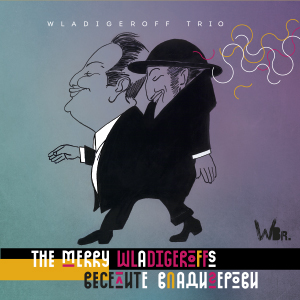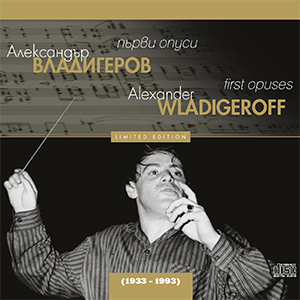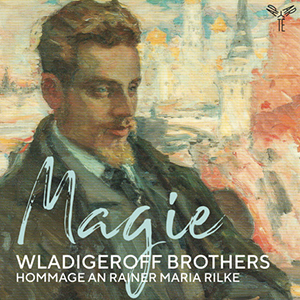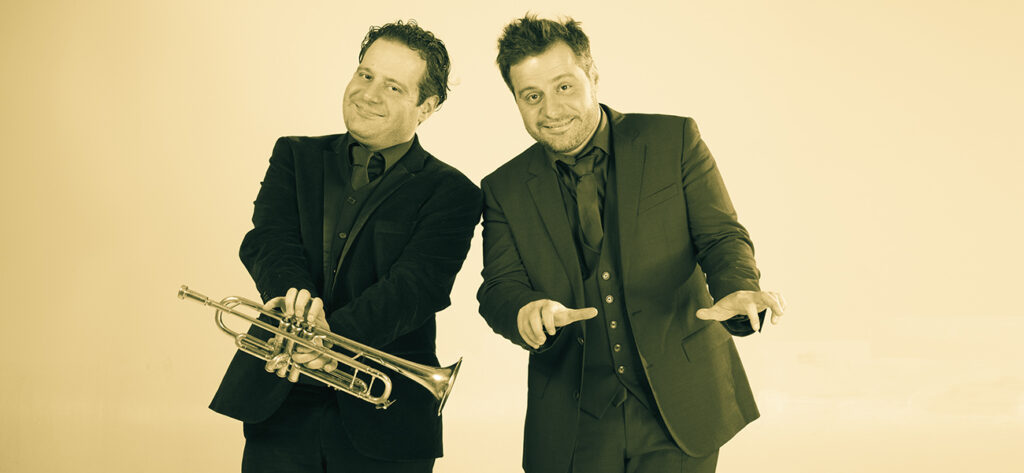
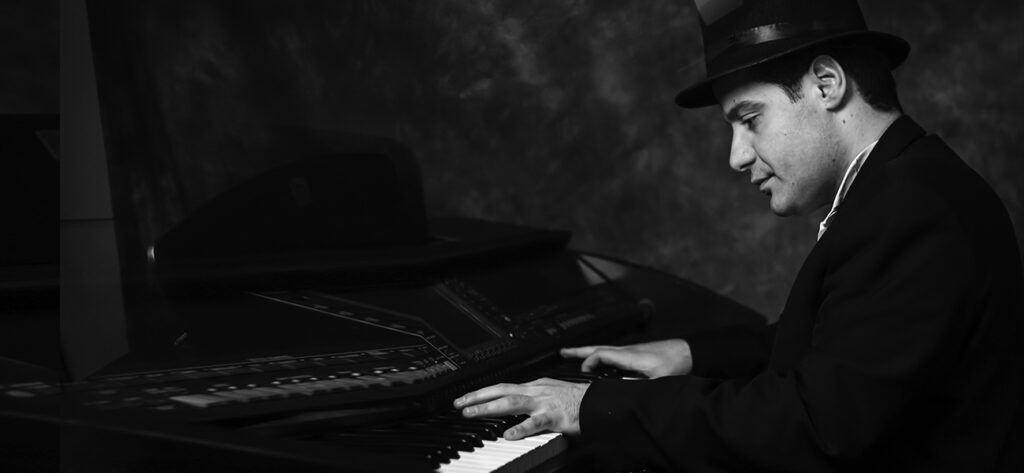
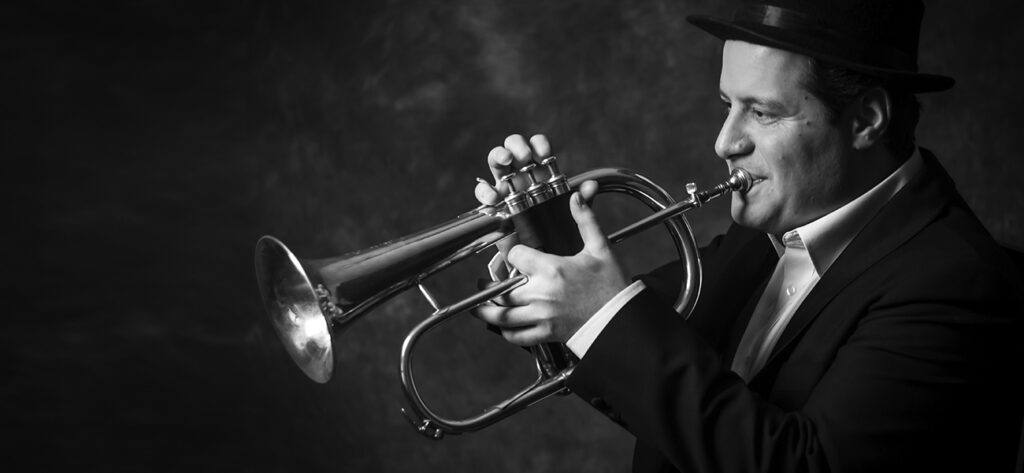
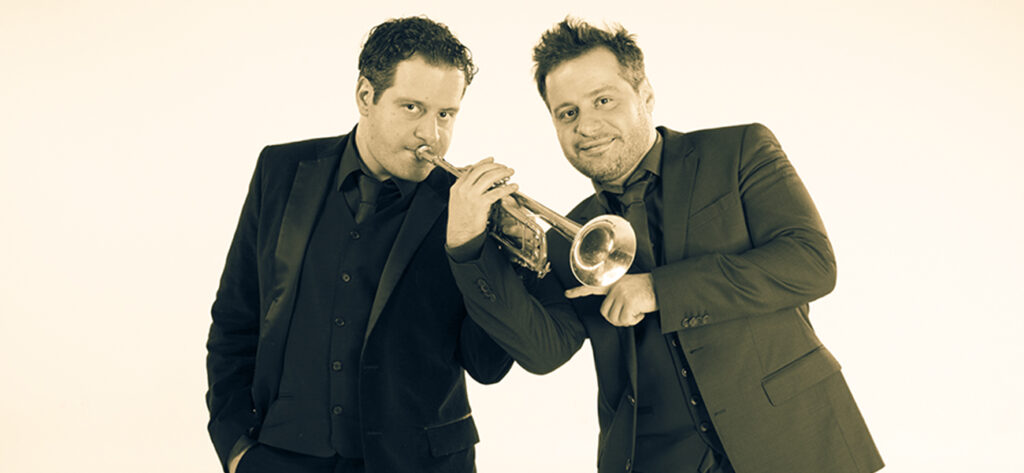
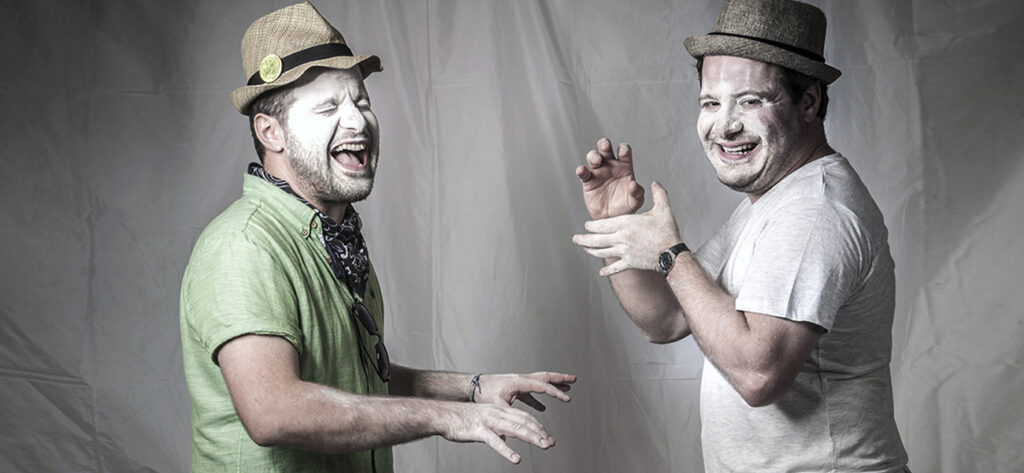
За някои артисти радостта от музиката изглежда по-скоро несериозна работа, а стремежът към академизъм често пречупва същината на свободното музициране. Подобна нагласа среща стопроцентов отпор в артистичните възгледи на братя Александър и Константин Владигерови. Написа за „въпреки.com” проф. Клер Леви, музикален критик за концерта им „Есенни джаз скици“ с Биг бенда на БНР.
new album The Merry Wladigeroffs
Interview on Jazz FM Sofia with Svetlio Nikolov
Ekaterina Dotcheva
October 23, 2022
In the middle of the life’s journey (not after Dante but contextualized for today) Konstantin and Alexander Wladigeroff (1978) recorded and issued a compact disk that differs from everything registered in their creative work up to now. Magie is the title of the CD and it is named after a poem of the great Austrian poet, born in Prague, Rainer Maria Rilke (1875-1926). In fact the music is a magnificent homage to Rilke, a collection of song forms composed by Konstantin and Alexander to put some poems of Rilke into music. Among them we find another two songs, also based on Rilke’s poems, created by the extraordinary Bulgarian musician and intellectual – the composer Tryphon Silyanovsky.
The label is Aparté (apartemusic.com). It is a French classical music record label led by Nicolas Bartholomée – its founder, manager and producer as well. Apperently Wladigeroff Brothers found in his person the needed broad-minded and understanding partner for the collaboration on Magie. Throughout the years I used to visit intensively the concerts of Wladigeroff Brothers. I do highly appreciate their musician’s nature, the creative instinct they own, their admittedly instrumental skills, giving a fillip to the special improvising flair that fascinates their auditory. And what is more: they are happy and playful musicians who create a hearing impression of infinity as they reflectively float across the territory of sounds. Their art comprehends easily quite different ages and styles every so often making free with an extreme fusion. In their own original and recognizable way. Within the brothers’ jazz improvisations flicker shadows of the past and the eclectic present, they frequently concentrate on the music of the predecessors – the grandfather Pancho and the father Alexander Vladigerov; the kin, so to speak, attracts them powerfully, they proudly remind where do they come from, in what a unique orbit had their life started to develop, continuing the work of the ancestors with music that is often bright patterned and shimmering, as if kaleidoscopic, but always drawing nearer and full of own gravity. It pierces the mind immediately, drags it to an island free from care, keeps it awake and never bored. It provokes and startles, at times even shocks – but always smiling like a child that shows what it can contrive with its favourite toys. And now – all of a sudden – Rilke. An absolutely different world, a different approach in the collected 16 tracks of a remarkable album. We owe its creation to the Covid situation that closed the whole world in 2020 but it also let both musicians open in detail the anthology The Most Beautiful Poems of Rainer Maria Rilke, edited by the outstanding German literary critic Marcel Reich-Ranicki. “This small book impelled us to elaborate and follow a new creative tendency that turned out to be very exciting for us”, write the musicians in the CD booklet. The composition and the arrangement of the songs, the recordings and the conceptual sequence as well took up two years.
The CD attracts initially with the fine craftsmanship of the cover & body and of the booklet (designer Xenia Vargov). On the cover we see the familiar portrait of the poet, made by Leonid Pasternak in 1928. The family name of Wladigeroff Brothers’ great-grandmother Eliza Pasternak occurs instantly by association. It is obvious that the colouring of the portrait has been decisive for the edition’s artistic design, directing somehow to the determining and dominant role of the poet and his epoch. 15 are the songs in the CD (Magie is recorded also as a reprise), 6 of them composed by Alexander, 7 by Konstantin and two songs written by Silyanovsky in 1953. The decision of the brothers to record and include Silyanovsky’s compositions in this album is an expression of the deep esteem and respect to him whom they refer as “our dear teacher and unforgettable friend”. All selected Rilke’s verses are reproduced in the booklet in their original language being happily juxtaposed to the skilful and elevated rendering of Plamen Hadjiyski.
The music in this exquisite edition convinces the listener that Rilke’s poetry and the world it forms are being perceived by the Wladigeroffs in a stunning way. I am not aware whether they limited their attention only to the verses that inspired them to make these songs, created in the historical Viennese musical Lied style with some modifications, or they tried to find an additional penetrating path to the thinking of the poet through his prose work. And this is probably not the most essential thing because the first touch to this music moulds the concept of a musical or tonal art nouveau – the music is so close to that visual style… Somewhere in the running motifs, in the unexpected twists, in the timbre invention emerges the colouring of Gustav Klimt… This music radiates in a very particular way – complete and connecting arts. Not only the tonal and the visual arts but also the theatrical one. And both songs of Tryphon Silyanovsky – Farewell and Pietà – are contrapuntal to the modern view of Alexander and Konstantin Wladigeroff on the possible sounding of Rilke’s word. Therefore it is not a surprise that the recordings include singers like Krassimira Stoyanova and Andreas Scholl, The Viennese Boys’ Choir, Sarah Traubel, Theodora Nestorova and Paul Schinkovitz. Into these so successful miniatures are woven the voices of two reciters – Christian Reiner and Robert Reinagl.
The respect to that poetry has also determined the melodic character of the songs – a predominating motif structure, an untraditional strophic form with frequent agogic changes, a kind of escapes, with a proper tone quality, an attentive intoning of the text to make it sound with a naturalness, with an ease that designates the magnificent sound cohesion between verse and tone, provoking the peculiar tempo ellipses and also the instrumental solutions performed by the quintet Morphing Strings Soloists brilliantly, with a differentiated sound, a fine sense of timbre and a true commitment to the atmosphere of the compositions wherein they take part. And the pattern of the songs themselves – an elevated melancholy in The Panther; a liturgical atmosphere with the children’s choir in To Me; a humble expecting of the “Nacht der Herrlickeit” in Advent; the completely distinct temperature and the changed grade of intimacy when the text is being submitted by a narrator, e.g. in I Kept Myself Too Open, where a gentle ostinato motif resembling a silent sharing embraces the subtle narrator’s voice as the poem slightly reshapes the verse to end with the question “Und du?”, adding to this incompleteness a continuation to something already created but forthcoming in the present day, something from the past that is yet to come… And the characteristic sounding of the children’s choir in the whole album’s entitling song Magie provokes inevitable associations with Rilke’s Notes on the Melody of Things: “I think of what we must do to let the whole melody ring out in the way it is heard by children.A silent voice would extend it over the scene and at an invisible signal the children’s voices would take it up and carry it on until this wide current would fill out the narrow evening room and rise to infinity.” Or the ritual climate in Final Piece, where the compressed mixed voice of the brass sextet comments with its dusky solemnity the expression pronounced by Andreas Scholl: “Der Tod ist groß...”, adding such strata to it that thereafter the verse is being enunciated as a kind of incantation. This is the final song of the compact disk. A reprise of Magie is appended to finish by an instrumental narrative full with a sonorous mentality that transpierces the poetic suggestion of the album as if provoking the sentence whispered by the reciter: “Hier ist Magie” that turns to elevate in a humbly coloured chorale discernment melting in the trickled tones that ring out from Konstantin Wladigeroff’s piano. Should I have to add that the effect provoked by these songs is due also to the recording quality? Apparently every team member who participated in the making of this CD had been attracted by the idea and the realization of this kind of intoning Rilke’s poetry. “I never expect you, I always recognize you”, wrote Marina Tsvetaeva to Rainer Maria Rilke in 1926 – the year of his death. What a magnificent definition for his personality and his work! I can assign it outright also to the unexpected for me creation of both musicians whose title Magie sounds to me as a unique possibility.
Ekaterina Dotcheva is a prominent Bulgarian musicologist, music critic, journalist, university lecturer and music producer. After her retirement as a radio journalist at the Bulgarian National Radio she continues to write about music in her own blog Decressendo.net. Her review about the CD album Magie of Wladigeroff Brothers is extracted from the blog www.decrescendo.net/vdhnoveno-vglezhdane-km-minaloto-koeto-oshhe-predstoi and translated from Bulgarian into English language by Plamen Hadjiyski with the kind permission of the author.
Ekaterina & Alexander & Konstantin Wladigeroff were born in Sofia, Bulgaria at the home of renowned conductor and composer Alexander Wladigeroff (1933-1993) and actress Velichka Chobanova - Vladigerova. The first steps in music are made under the influence of the artistic spirit in W’ladigeroff’s home. The trio Wladigeroff / Trio Vladigerov projects are intended to represent the musical tradition of the Wladigeroff family in its development over three generations. They are deeply revered for the immense and invaluable artistic value of the musical heritage. Maintaining its authenticity is of paramount importance in developing every new musical idea of theirs. In the last ten years, Alexander and Konstantin Wladigeroff have released five albums with their own compositions:
- Wanderer in Love (2007)
- For The Greatest And Little Things (2011)
- Dreaming Of Dreams ( 2014)
- Dedicated Sounds (2014)
- The Rag Waltz Time (2017)
- Magie (2022) in which they express their individuality and original composer's style with virtuoso ease and rich fantasy.
The Trio Wladigeroff concert performances are a live retrospective of music created over 120 years by three different generations, gained experience and inspiration from the wealth of Bulgarian folklore. They have performed in Austria, Bulgaria, Belgium, the United Kingdom, America, South Africa, Germany, Italy, Canada, Luxembourg, Russia, Israel, Switzerland, Hungary, Poland and the Czech Republic.
